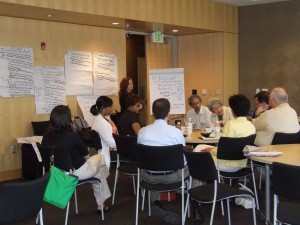The invitation-only “Families Matter” Symposium was held last Thursday and Friday, June 24 and 25, at the University of Baltimore. Co-sponsored by CFCC and the American Bar Association Section of Family Law, the symposium promises to be a powerful catalyst for change. It was exhiliarating to participate in the exchange of groundbreaking ideas that emerge when you put together some of the leading professionals from a range disciplines to discuss how to improve the experience of children and families in the family justice system. More exciting, however, is the fact that this group of high-powered experts is committed to move from theory to action by implementing many of their recommendations for changing the family law system.
 |
||||
| A small group led by CFCC Senior Fellow Gloria Danziger discusses the availability and use of services for family court litigants. (Photo by Chris Hart) |
In between these powerful speeches, participants worked in small, interdisciplinary groups, identifying some of the most urgent problems facing the family justice system, analyzing solutions to those problems, and creating action steps for implementation. In each small group there were some of the country’s top family lawyers, judges, mental health professionals, accountants, academics, and domestic violence experts, each offering his/her perspective on how the current family justice system hurts children and families and what each discipline can offer to alleviate the harm. After each small-group session, participants gathered in a plenary to report on progress and to bounce ideas off of the larger collection of over 60 participants.



Very well done. Funny, I blogged about it too (http://www.kssfamilylaw.com/blog/?p=79). Here's some of what I said:While the program was a great start, it was only that, a start. There were great ideas that will take a lot of effort and time to implement. There was a consensus that it is impossible to create a flow chart for a family law case that would work perfectly. Every case is different. But there was agreement on many needed changes to the family law system. The concept of “triage”, immediately figuring out what a case needs and prioritizing situations based on different priorities (violence, kids needs, foreclosure?) was considered. ”Early case intervention” was another popular (and similar) thought. Another discussion focused on law school preparation (and encouragement) of students to practice in this area. So what are the next steps? One step is a comprehensive CLE Program which will be worked into the ABA Family Law Section‘s next Spring CLE seminar. Beyond that we must figure out how to assimilate these and other great ideas into the general practice of family law. Judge and lawyer training and specialization? More frank discussions between the bench and bar (and mental health experts)? Family law is becoming more, not less complex. Relocation issues, gay marriage issues, international custody issues are all on the rise. Without consistently taking the time to study and try to improve our family law system, we do a disservice to our community. Kudos to all those (and there are so, so many) that take the time and effort to work to better our system. Our superior court judges and their staffs, the many governmental agencies that are overburdened, and the legal and mental health practitioners who see the problems daily are all doing their part. The question is what else can we do. Certainly we all agree more needs to be done. So let’s keep exploring what can be done, and of course, lets do as much as we all can.
Thanks for your comment, Randy. Your question about how we can each make a difference is an important one. Too often, people talk about reform but don't actually implement their good ideas. At the Symposium, we really had a collection of individuals who were all ready and willing to not only discuss but to actually do something – and it is important for all of us to keep that mindset going forward. One of the advantages of this initiative is that, because it has in some ways just begun (even though there was a lot of work put into getting to where we are), all of the participants and other professionals who are passionate for reform can really help to map where it goes and determine their own level of involvement.